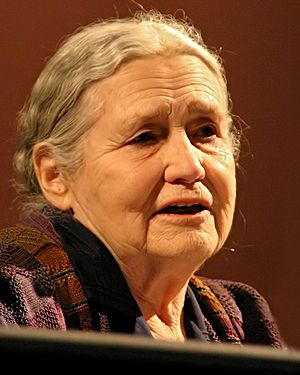
“That is what learning is. You suddenly understand something youve understood all your life, but in a new way.”
Share this quote:
“With a library you are free, not confined by temporary political climates. It is the most democratic of institutions because no one - but no one at all - can tell you what to read and when and how.”
Share this quote:
“Think wrongly, if you please, but in all cases think for yourself”
Share this quote:
“In the university they dont tell you that the greater part of the law is learning to tolerate fools”
Share this quote:
“There is only one real sin, and that is to persuade oneself that the second-best is anything but the second-best”
Share this quote:
“The great secret that all old people share is that you really havent changed in seventy or eighty years. Your body changes, but you dont change at all. And that, of course, causes great confusion.”
Share this quote:
“Trust no friend without faults, and love a woman, but no angel.”
Share this quote:
“Pearls mean tears.”
Share this quote:
“And then, not expecting it, you become middle-aged and anonymous. No one notices you. You achieve a wonderful freedom.”
Share this quote:
“Political correctness is the natural continuum from the party line. What we are seeing once again is a self-appointed group of vigilantes imposing their views on others. It is a heritage of communism, but they dont seem to see this.”
Share this quote:
“The weaknesses of the many make the leader possible”
Share this quote:
Trust no friend without faults, and love a woman, but no angel.
Share this quote:
There is no doubt fiction makes a better job of the truth.
Share this quote:
Listen Anna, if we don’t believe the things we put on our agendas will come true for us, then there’s no hope for us. We’re going to be saved by what we seriously put on our agendas.
Share this quote:
Novels give you the matrix of emotions, give you the flavour of a time in a way formal history cannot.
Share this quote:
I dont know much about creative writing programs. But theyre not telling the truth if they dont teach, one, that writing is hard work, and, two, that you have to give up a great deal of life, your personal life, to be a writer.
Share this quote:
I write all these remarks with exactly the same feeling as if I were writing a letter to post into the distant past: I am so sure that everything we now take for granted is going to be utterly swept away in the next decade. ...)
Share this quote:
This is an inevitable and easily recognizable stage in every revolutionary movement: reformers must expect to be disowned by those who are only too happy to enjoy what has been won for them.
Share this quote:
Ideally, what should be said to every child, repeatedly, throughout his or her school life is something like this: You are in the process of being indoctrinated. We have not yet evolved a system of education that is not a system of indoctrination. We are sorry, but it is the best we can do. What you are being taught here is an amalgam of current prejudice and the choices of this particular culture. The slightest look at history will show how impermanent these must be. You are being taught by people who have been able to accommodate themselves to a regime of thought laid down by their predecessors. It is a self-perpetuating system. Those of you who are more robust and individual than others will be encouraged to leave and find ways of educating yourself — educating your own judgements. Those that stay must remember, always, and all the time, that they are being moulded and patterned to fit into the narrow and particular needs of this particular society.
Share this quote:
As in the political sphere, the child is taught that he is free, a democrat, with a free will and a free mind, lives in a free country, makes his own decisions. At the same time he is a prisoner of the assumptions and dogmas of his time, which he does not question, because he has never been told they exist. By the time a young person has reached the age when he has to choose (we still take it for granted that a choice is inevitable) between the arts and the sciences, he often chooses the arts because he feels that here is humanity, freedom, choice. He does not know that he is already moulded by a system: he does not know that the choice itself is the result of a false dichotomy rooted in the heart of our culture. Those who do sense this, and who dont wish to subject themselves to further moulding, tend to leave, in a half-unconscious, instinctive attempt to find work where they wont be divided against themselves. With all our institutions, from the police force to academia, from medicine to politics, we give little attention to the people who leave—that process of elimination that goes on all the time and which excludes, very early, those likely to be original and reforming, leaving those attracted to a thing because that is what they are already like. A young policeman leaves the Force saying he doesnt like what he has to do. A young teacher leaves teaching, here idealism snubbed. This social mechanism goes almost unnoticed—yet it is as powerful as any in keeping our institutions rigid and oppressive.
Share this quote: